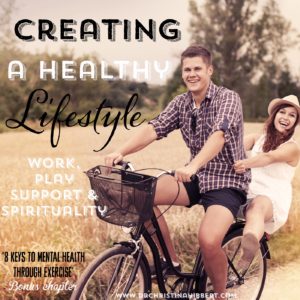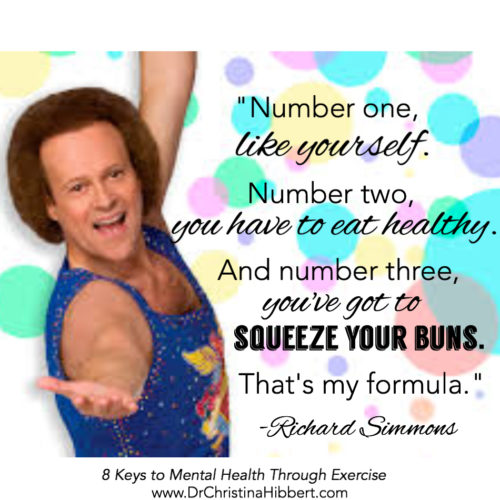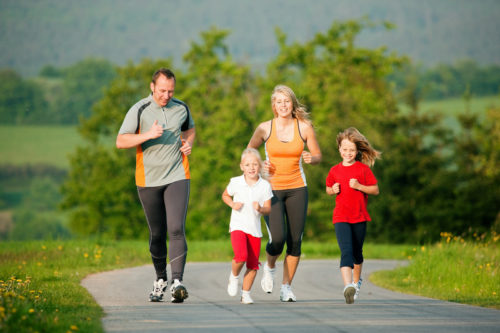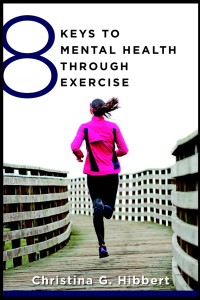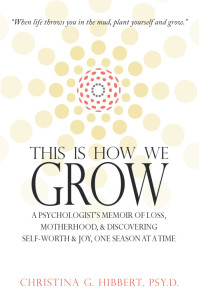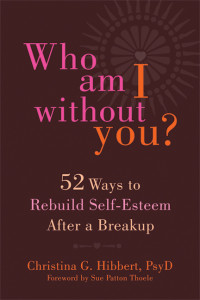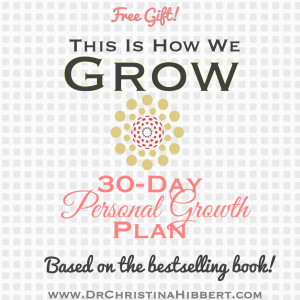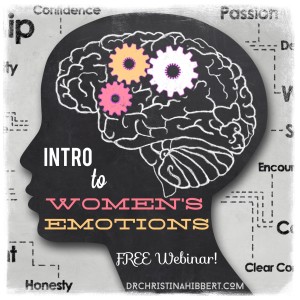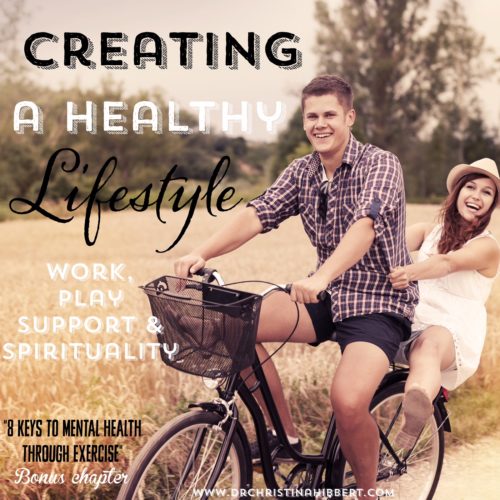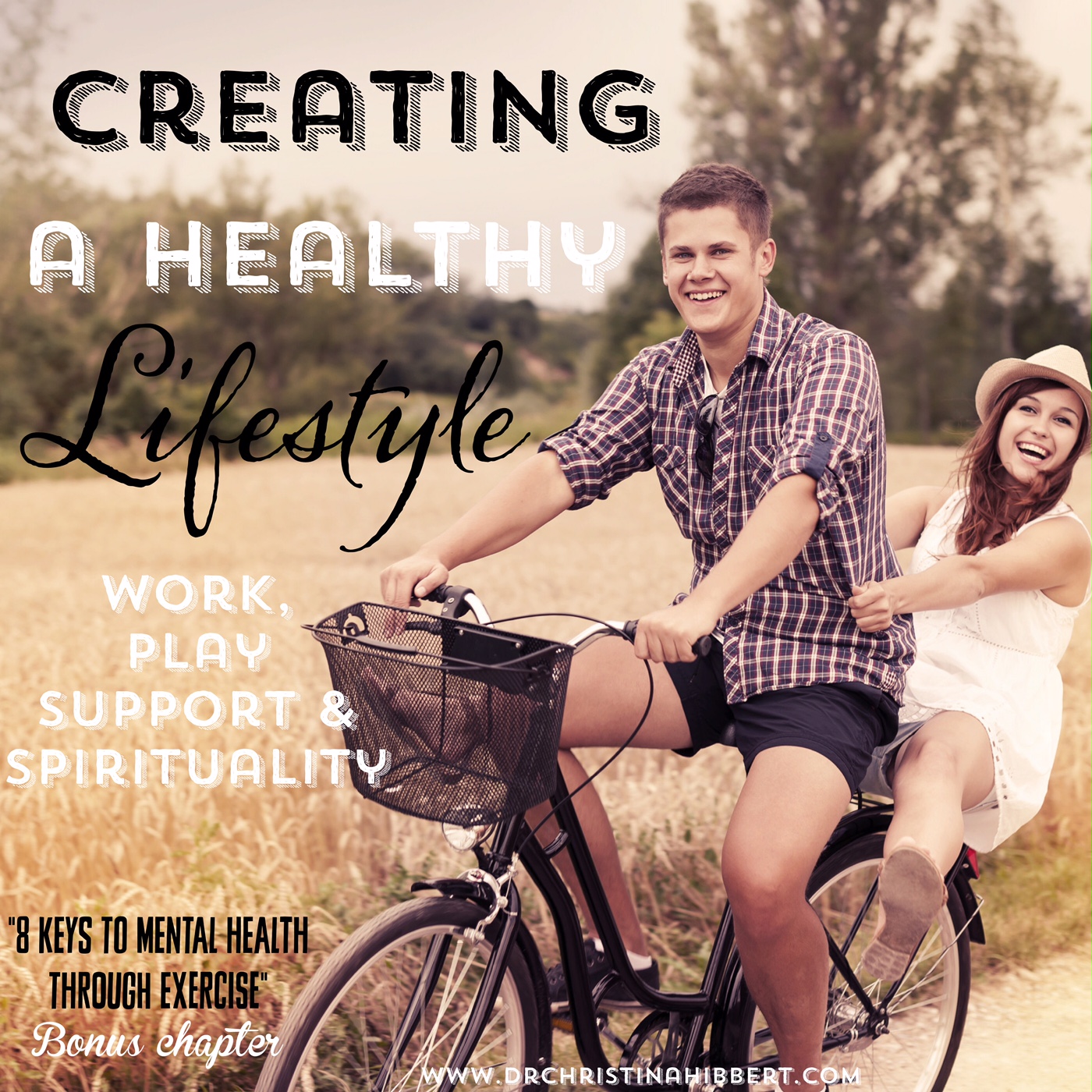
13 Oct Creating a Healthy Lifestyle- Exercise, Play, Work, Support & Spirituality (8 Keys to Mental Health Through Exercise bonus chapter, part 1)
It’s been far too long since I last posted, and even if it’s been for good reasons (like recovering from a concussion while managing a book tour, back-to-school, family, and work), I’m ready to be back!
To start back with a bang, I’m sharing a full bonus chapter from my recently released 3rd book, 8 Keys to Mental Health Through Exercise. All about how to create a healthy lifestyle, this chapter was not included in the final edition of the book. You can only get it here!
Part 1 discusses “other factors” that can influence health, happiness, and even whether or not you exercise–things like work, play, support, and spiritual connection. Part 2 will focus on the important interplay between exercise and sleep, and part 3 is all about nutrition and exercise for a long, healthy, happy life.
I hope this bonus chapter inspires you to make some healthy, happy, lifestyle choices today!
Creating a Healthy Lifestyle
(8 Keys to Mental Health Through Exercise, bonus chapter, Part 1)
A healthy lifestyle isn’t about any one factor. It’s about one’s entire package of habits, behaviors, thoughts, and coping techniques. The beautiful part is we can always work to improve our lifestyle. We can work to change habits, alter behaviors, and incorporate new strategies and tools to help us overcome, become, and flourish.
Of course, one of the best things we can do for a healthy and happy life is to exercise, and when I say, “exercise” what I really mean is to move your body–to be active, on a regular basis. Exercise is key to our overall physical and mental health wellbeing. [You can learn more about exercise for mental health, and for lifelong wellness, in 8 Keys to Mental Health Through Exercise, and in the posts, below.]
While we’ve certainly determined that exercise isn’t just about losing weight, getting in shape, or even just about physical health, it’s also clear that exercise is more effective when supported by a healthy lifestyle. You can run and swim and do yoga every day, but if you’re not sleeping, eating right, if you’re running on caffeine and adrenaline and never finding down time, then all that exercise won’t make much difference to your mental health. Your body will be so stressed it will counteract many of the benefits of exercise.
For some, “healthy lifestyle” means cutting out fast food, seeking to reduce stress, and stretching every day. For others, it means cutting out gluten, dairy, and sugar, meditating, and running ten miles a week. There is no one way to be healthy. However, one thing is clear: Only you can create a healthier lifestyle. Sure, friends, family, doctors, or others might encourage, inspire, help, or show you how to change your lifestyle, but ultimately it’s you who decides to do it.
When I say, “create a healthy lifestyle,” what I’m really asking you to do is to create a healthier lifestyle. Whatever your current way of eating,
sleeping, working, or playing, there is room to grow. Most of us have one or two areas that could use a little improvement, and many of us have several. The point isn’t to go out and immediately change your diet, exercise, sleep, work, play, relationships, and so on. It’s to start with one area, and when you feel “healthier,” then move on to another. And so on, until you’re where you want to be.
There are three main components of a healthy lifestyle, which work together to create overall health. These are 1) sleep, 2) nutrition, and 3) exercise. I have long said that we need these three things in order to have energy to meet the physical, mental, and emotional demands of life, and experts universally hail exercise, nutrition, and sleep as the primary foundation of overall health (Hirshkowitz, 2013). Each of these three things creates energy for the body and mind, and without these, we simply can’t experience all the benefits a healthy lifestyle can offer.
(We will examine each of these three in more depth in parts 2, 3, and 4 of this excerpted chapter series)
Other Keys to a Healthy Lifestyle
While sleep, nutrition, and exercise form the foundation of a healthy lifestyle and greater mental and physical health, they’re not the only lifestyle choices that impact and are impacted by exercise. Family, relationships, work, play, downtime, stillness, and spiritual connection all play a role in exercise success and mental health, too. Let’s take a look.
Support System
We need support to stick with exercise, and if we don’t have it from our current friends or family, we need to seek it from other sources.  Those with families who have negative beliefs or behaviors related to exercise tend to struggle more with diet and exercise self-care themselves (Wen, Shepherd, & Parchman, 2004). While overall family support is important, it’s the spouse/partner who actually seems to be the most influential (Allen & Morey, 2010). If you are struggling to get support from your spouse, don’t give up. Seek social support in other ways, and keep striving to help your partner understand why you won’t give exercise up.
Those with families who have negative beliefs or behaviors related to exercise tend to struggle more with diet and exercise self-care themselves (Wen, Shepherd, & Parchman, 2004). While overall family support is important, it’s the spouse/partner who actually seems to be the most influential (Allen & Morey, 2010). If you are struggling to get support from your spouse, don’t give up. Seek social support in other ways, and keep striving to help your partner understand why you won’t give exercise up.
Having friends who not only support you but engage in exercise with you can also make a big difference in sticking with it. Regular exercise is conversely associated with greater social satisfaction, especially for those participating in group exercise. Feeling like “part of a group” leads to greater self-confidence and self-efficacy, and decreases loneliness in later life. There are two ways social support affects exercise engagement and adherence: 1) Exercising with the support of friends/family increases your perceived level of control over your behavior and life, which increases exercise intentions, which leads to greater exercise adherence, and 2) Group cohesion improves exercise attitude, which increases exercise intentions and thus exercise adherence (Courneya & McAuley, 1995).
Nan struggled with exercise, and with her weight, her whole life. She’d tried walking, jogging, running, and swimming like her sisters had enjoyed doing, but just couldn’t stick with any of them. She felt isolated; even though she had sisters who exercised regularly, they preferred doing so alone and Nan wasn’t sure what to do. Until she discovered Zumba. Not only was Zumba fun and engaging, it kept her mind off the fact that she was “exercising.” Zumba also provided build-in social support. The friends she made in her class became part of her daily life, and so did Zumba. She has lost 50 pounds, is eating much healthier, and mostly, she reports far greater self-confidence, energy, and love, knowing that she is not alone.
Join a group fitness class; sign up for a group race; if you belong to a gym, be friendly and engage with those around you; make friends with those who are obviously believers in exercise, too, and you’ll feel healthier and happier.
Work

This is me, on our family vacation in 2013, finishing my second book proposal, due that day, while my 10 year-old daughter drove the boat (in my husband’s lap) back to the dock so I could email it out! Talk about too busy.
Work is often quoted as a major reason people don’t exercise. “I’m too busy.” “Work is too stressful.” “When I get home, I only have time for my family.” It’s certainly difficult to balance work, home, and family.
There is a high correlation between stressful work environment and increased stress, depression, and even heart disease. Work stress can also affect other factors like sleep, nutrition, exercise, and physical and mental health, and work environments that are more stressful experience a lower level of work productivity from their employees (Karacek, 1992). Jobs that promote greater autonomy, learning, and physical activity are much “healthier” and linked with greater exercise adherence than those that are highly stressful with low decision-making ability and new learning opportunities.
For many, the work-home balance is a huge factor in the level of perceived life stress, and consequently, in how much you exercise. However, research also shows that exercise may be just what you need. In fact, studies show a clear relationship between exercise and one’s ability to manage work and home. Intuitively, it seems that exercising presents just one more “thing to do” when time is already scarce, and this is precisely why so many parents and working professionals drop it. Yet, because exercise reduces stress, it provides a release that enables greater family interaction and work productivity. As one researcher put it, “A reduction in stress is tantamount to an expansion of time” (Clayton, 2014).
Regular exercise also increases self-efficacy. Self-efficacy is the belief that we can handle challenges effectively, and this appears to carry over into our home and work roles (Clayton, 2014). Work is important to life—yes, to make a living, to support a family, but also because meaningful work is associated with greater mental health and flourishing. Exercise is key to less stressful, meaningful work, since it reduces stress and increases self-efficacy (Clayton, 2013). People who exercise regularly report better work performance and confidence from exercise.
Some ways to improve exercise adherence on workdays include:
- Seek to exercise early in the workday, or even before work. It’s too easy to find reasons not to exercise later in the day.
- Bring your walking shoes and use your lunch break to take a brisk walk or jog.
- If you work in a large building, take the stairs. Adding stairs to your every day routine will boost your energy level and increase your total exercise time.
- Take a yoga or Pilates class, or do it at home in the morning or before bed. Yoga and Pilates are not only great, safe workouts, they’re great stress-relievers.
- Encourage your workplace to embrace new habits, like walking meetings or “booster breaks,” where you can take 10-15 minutes to breathe, stretch, and do light aerobic exercise throughout the day. It will actually boost employee confidence and productivity—a win-win (Clayton, 2014).
Down Time & Play
When we think of play and “down time,” most of us probably think of children. Play is crucial to children’s development, but unfortunately, playtime has significantly decreased in the past decades. Researchers believe this is one of the reasons why childhood & adolescent mental illness has been on the rise. Five to eight times as many high school and college students are diagnosed with an anxiety or depressive disorder today, compared to fifty years ago (Gray, 2010).
But children and adolescents aren’t the only ones who need play and down time. Studies show adults need it just as much. Many adults have no clue how to relax, have a little fun, and “play;” they think it’s not something “adults do,” or that they’ll be a “slacker” if they let loose.
Researcher Stuart Brown, MD, has described play as spending time without purpose, and states that play is not only important, it’s essential to human brain development, creativity, intelligence, innovation, mental health, and happiness (Brown, 2008). “The opposite of play is not work; it’s depression,” he says, making a strong case for keeping play part of our adult lives.
Play involves any activity that helps you let go, relax, have fun, and give your brain a break for a while. This can include physical activities, like gardening, playing golf or tennis, or even scuba-diving going for a hike or more relaxing activities, like reading, napping, or lying on the grass looking for shapes in the sky with your child. The point is to engage in activities that disengage your brain and give you a break from your regular routine. When we make time for downtime and play, we are much more likely to feel mentally and physically strong and happy.
Stillness & Spirituality
Along with downtime and play, we need stillness and “un-plugging.” We’re constantly connected—through the Internet, smartphones, satellite TV, laptops, and tablets. It’s more common to wake up and check Facebook or email than it is for people to wake up and watch the sunrise. Yet, all that connection is preventing real, deep connection—connection with family, friends, and faith—spiritual connection.
Spiritual connection underlies emotional, mental and physical health. Caring for body, mind, and spirit is linked with faster healing, greater longevity, and better overall wellness. It is suggested that physicians should recommend spiritual practices for patients, and that those who fail to do so are doing a great disservice to their patients (Koepke, n.d.).
Spiritual connection keeps us mindful of life, meaning, and purpose, no matter how we choose to practice it. Connecting every day through prayer, meditation, scripture study, pondering, stillness, nature, church, and whatever else brings you a greater sense of spirituality will increase your desire and motivation for exercise. As you quiet your mind, feel your soul, and remember you’re more than your body, you’ll want to care for all of yourself more fully, because you’ll know how important a healthy body and mind are to increased spiritual growth.
Exercise can also serve as a form of spiritual discipline. It can help you feel God’s love and appreciate your body more. It can also provide mental clarity to increase spiritual connection. I always say a prayer of gratitude as I begin my daily walk or jog, and exercise has become a sacred experience for me—one in which I can feel open, healthy, happy, and inspired. Some researchers have even suggested that caring for our physical body through exercise is a powerful way to experience the Divine, as we care for “God’s creation,” and work to flourish (Greenwood & Delgado, 2013).
Watch for Parts 2 and 3, all about Sleep & Nutrition–coming soon!
“8 Keys to Mental Health Through Exercise“ is here!
“…Enlightening and empowering…” ~Publisher’s Weekly
Order online at Norton.com, Amazon, Barnes & Noble, Target.com, or Walmart.com, or visit your local bookseller today!
“Choose to grow” with my bestselling, award-winning memoir, This is How We Grow!
Available at Amazon or Barnes & Noble!
Build true self-worth, confidence, and love with “Who Am I Without You.”
Available now at
Target, Amazon, Barnes & Noble, New Harbinger, or your local bookseller!
Watch my “Postpartum Couples” DVD FREE, online!
Join my “This is How We Grow” 30-Day Personal Growth Plan!
Take my FREE Webinar, “Intro to Women’s Emotions,” or register for my 3-part Webinar Course on “Women’s Emotions: Caring for your Brain, Hormones, and Mental Health to Overcome, Become & Flourish!’
Let’s Connect!
SUBSCRIBE, above, “Like” me on Facebook Dr. Christina Hibbert; This Is How We Grow, & follow me on Twitter, Pinterest, & Instagram
Related Posts/Articles:
Mom Mental Health Through Exercise: Pregnancy, Postpartum, Motherhood & Beyond
Exercise for Mental Health: How to Get (& Stay Motivated)
40 Physical & Mental Health Benefits of Exercise
Get Mentally & Physically FITT: How to create an exercise program that works
Exercise as a Family to Build Stronger Relationship, Mental & Physical Health
50 Fun Ways to Exercise as a Family
Exercise to Improve Self-Esteem
Exercise for Mental Health: Key 1, Make it Fun!
Meditation for Mental Health, Personal & Spiritual Growth: The Spirit Meditation

